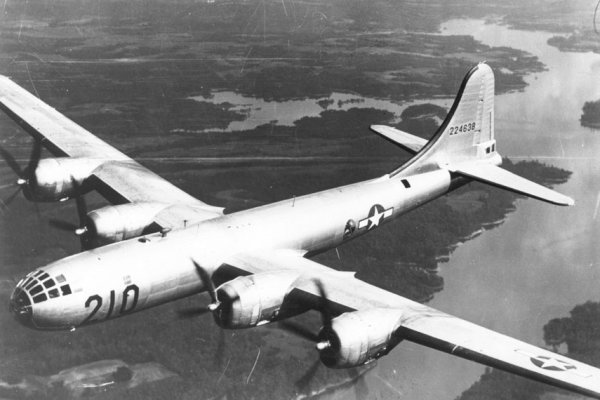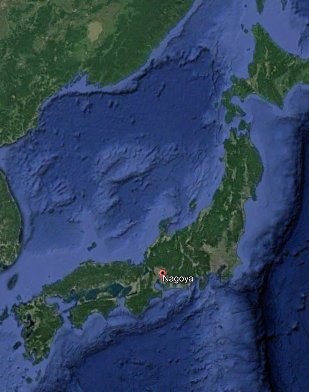ACUFO-1945-05-17-SOUTHNAGOYA-7
The Tactical Mission report for mission 176 by the 21st Bomber Command of the U.S. Army Air Forces documented the air raid of the night of May 16-17, 1945, over the South Nagoya urban area in Japan. Several cases of “balls of fire” and other oddities observed by the aircrews of the B-29's bombers appear in this report.
In one instance, the report tells:
“g. A ball of fire was noted taking off from Nagoshima or Awase. It looked like a tracer and came up to the reporting plane's altitude almost immediately and stayed around 5 o'clock low. It remained about 1000 yards away. At an indicated air speed of 225 miles per hour, it continued to gain; at 250 it could not keep pace. From 1000 yards it appeared the size of a volley ball, sputtering from the rear. Wings or fuselage could not be detected.”
| Date: | May 17, 1945 |
|---|---|
| Time: | Night. |
| Duration: | ? |
| First known report date: | May 17, 1945 |
| Reporting delay: | Hours. |
| Country: | Japan |
|---|---|
| State/Department: | Aichi |
| City or place: | South Nagoya |
| Number of alleged witnesses: | 1 to 11 |
|---|---|
| Number of known witnesses: | ? |
| Number of named witnesses: | 0 |
| Reporting channel: | Military mission report. |
|---|---|
| Visibility conditions: | Night, undercast. |
| UFO observed: | Yes. |
| UFO arrival observed: | Yes. |
| UFO departure observed: | ? |
| UFO action: | Approached, followed, could not keep pace. |
| Witnesses action: | Accelerated. |
| Photographs: | No. |
| Sketch(s) by witness(es): | No. |
| Sketch(es) approved by witness(es): | No. |
| Witness(es) feelings: | ? |
| Witnesses interpretation: | ? |
| Sensors: |
[X] Visual: 1 to 11.
[ ] Airborne radar: [ ] Directional ground radar: [ ] Height finder ground radar: [ ] Photo: [ ] Film/video: [ ] EM Effects: [ ] Failures: [ ] Damages: |
|---|---|
| Hynek: | NL |
| Armed / unarmed: | Armed, 12 Browning M2 12.7 mm machine guns. |
| Reliability 1-3: | 3 |
| Strangeness 1-3: | 2 |
| ACUFO: | Unidentified. |
[Ref. aaf1:] U.S. ARMY AIR FORCES:
This report was of the 21st Bomber Command Tactical Mission No. 176, flown 16-17 May 1945, the target being the Mitsubishi Aircraft Works at the South of the Nagoya Urban Area, Japan.
The units involved were the 58th, 73rd, 313th and 314th Bombardment Wings. The take-off was at Iwo Jima, the initial point (IP) was at Biwa Lake, landfall was at O Shine.
The targets were first reached at 161705Z and last at 161930Z, i.e. in local time, first at 02:05 a.m. on May 17, 1944, and last at 04:30 a.m. on May 17, 1944.
The report below appeared in the “Enemy Air Opposition” part of the report. This part included information about the enemy aircraft encountered during the mission and what these did.
In this “Enemy Air Opposition” part, there was also a section titled “Observations of Unusual Types”, followed by a section “Balls of fire”, in which several observation of what was thought to be other things than planes, rockets, flares and flak, appeared. It included:

|
[... other “balls of fire”...]
g. A ball of fire was noted taking off from Nagoshima or Awase. It looked like a tracer and came up to the reporting plane's altitude almost immediately and stayed around 5 o'clock low. It remained about 1000 yards away. At an indicated air speed of 225 miles per hour, it continued to gain; at 250 it could not keep pace. From 1000 yards it appeared the size of a volley ball, sputtering from the rear. Wings or fuselage could not be detected.
[... other “balls of fire”...]
Anti-aircraft was described as meager and inaccurate, with large percentage of B-29's repotring no antiaircraft on the target. Searchlights rarely penetrated the undercast, and when they did, “dispensing of rope and desynchronisation of the engines proved effective.”
Out of the 468 U.S. Army aircraft over all targets, none were lost and 20 were damaged.
An estimated number of 30 enemy aircraft were reported, making only 11 attacks on the B-29's. 6 B-29's were damaged by these enemy aircraft but none were destroyed. 5 of the enemy aircraft were reported to carry a searchlight.
7 cases of “balls of fire” reports were included in the report of this mission - the summary said “eight or ten” - in the specific section “Balls of fire” part of the mission reports, with also one case of “possible jets” (Japan had no jet planes) and 2 “possible Baka” (Japanese piloted rocket flying bomb) in the “Observation of unusual types” section. This case file is about 1 of these observations, I documented each case of this mission in its own file.
The Boeing B-29 “Superfortress” was the heaviest bomber of the U.S. Army Air Forces, used in operations from May 8, 1944 and on. Its maximum speed was 574 km/h.
Its defensive armament was 12 Browning M2 12.7 mm machine guns.

|

|
Because this “ball of fire” seem to have come from the ground, the first idea would be that it was a ground-to-air-rocket. But it then “stayed”, and “remained about 1000 yards away” so it was not a rocket.
Then, one may think it was a Japanese fighter plane. But first, “Wings or fuselage could not be detected”, then, as in the other “balls of fire” reports, it made no attempts to attack the B-29 although it was near.
All this would not be enough to positively demonstrate that it was an alien spaceship; but I have no clear explanation for now.
Unidentified.
* = Source is available to me.
? = Source I am told about but could not get so far. Help needed.
| Main author: | Patrick Gross |
|---|---|
| Contributors: | None |
| Reviewers: | None |
| Editor: | Patrick Gross |
| Version: | Create/changed by: | Date: | Description: |
|---|---|---|---|
| 0.1 | Patrick Gross | April 22, 2024 | Creation, [aaf1]. |
| 1.0 | Patrick Gross | April 22, 2024 | First published. |